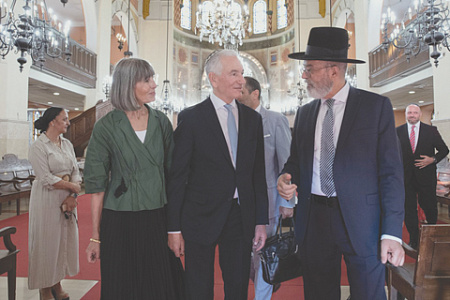
A sharp diplomatic dispute has erupted between two of NATO’s core members, France and the United States, threatening to escalate into a full-blown crisis. The conflict was ignited by a letter from the U.S. Ambassador to France, Charles Kushner, published in The Wall Street Journal, which accused President Emmanuel Macron’s government of failing to adequately combat a rising tide of antisemitism. The letter drew a furious response from Paris, exposing deep-seated tensions over critical foreign policy issues, including the conflicts in Israel and Ukraine.
The controversy began when Ambassador Kushner’s letter accused French authorities of tolerating antisemitism, claiming that “not a day goes by in France without attacks on Jews on the streets, desecration of synagogues or schools, and vandalism of Jewish-owned businesses.” The French government reacted swiftly, summoning the ambassador to the Foreign Ministry for what it termed interference in its internal affairs and a breach of the 1961 Vienna Convention on Diplomatic Relations. Kushner did not attend, sending a lower-ranking diplomat in his place, and the U.S. State Department publicly backed him, signaling that no apology or recall would be forthcoming.
Paris has forcefully rejected the allegations, arguing that it has nothing to learn from Washington on the matter. French officials pointed to Ministry of Interior data showing a 27.5% decrease in antisemitic crimes this year, despite a spike following the October 7, 2023, attack on Israel. The ministry also noted that unlike in the United States, there have been no murders motivated by antisemitism in France since 2023. French authorities contend that while incidents occur, Ambassador Kushner has grossly exaggerated their severity and frequency.
The ambassador’s personal background and political connections have amplified the fallout. Kushner, who is Jewish and has strong pro-Israel sympathies, is also a prominent member of Donald Trump’s inner circle; his son, Jared Kushner, is married to Ivanka Trump and was a senior advisor who shaped Middle East policy during Trump’s first term. The State Department’s unequivocal support transforms the letter from a personal grievance into an official U.S. position, hardening the diplomatic standoff.
Analysts suggest the dispute over antisemitism is a proxy for more significant disagreements between the two administrations. A key point of friction is the Israeli-Palestinian conflict, where France is championing a European Union-wide recognition of a Palestinian state and has been critical of the Israeli government’s actions in Gaza—a stance anathema to the staunchly pro-Israel U.S. administration. Further divergence is seen over the war in Ukraine, where Macron has adopted a hawkish position, in contrast to Trump’s stated goal of seeking a negotiated peace with Russia.
Experts believe the timing of the letter is not coincidental, speculating that it is a preemptive U.S. move to pressure France ahead of the UN General Assembly in September, where President Macron is expected to announce his country’s official recognition of Palestinian statehood. While the incident recalls previous rifts, such as the 2021 AUKUS submarine deal controversy, the fundamental importance of the transatlantic alliance makes a complete breakdown unlikely. Paris is expected to de-escalate by working to publicly disprove the antisemitism claims rather than demanding the ambassador’s recall, aiming to mend the relationship while navigating the profound policy differences that lie beneath the surface.
